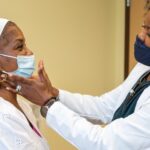(BPT) – Imagine having dinner with friends, and knowing someone just said something funny, because everyone at the table is laughing. You’re too embarrassed to admit that you didn’t hear the joke, so you laugh along with everyone else. For many, living with hearing loss is a daily struggle. But it doesn’t have to be. The U.S. Food and Drug Administration (FDA) has approved over-the-counter (OTC) hearing aids, providing affordable, safe, hearing aids for millions of adults suffering from mild to moderate hearing loss.
Untreated hearing loss is isolating, and associated with depression, anxiety, low self-esteem, dementia, reduced mobility. and falls. Hearing aids helps improve your ability to talk with family and friends, communicate with physicians, and hear music, movies and TV. Adults 18 and older with mild to moderate hearing loss can purchase OTC hearing aids without a medical exam, prescription, or a professional fitting online or in stores.
OTC hearing aids can be effective for adults with mild to moderate hearing loss.
- You will need to control the many settings for OTC hearing aids yourself.
- OTC devices must include the words “OTC” and “hearing aid” on the outside packaging.
- Only one in four adults in the U.S. who could benefit from hearing aids have used them, and most people with hearing loss wait nearly 10 years before obtaining hearing aids.
Signs OTC hearing aids may help.
- Speech or other sounds seem quiet or muffled.
- You have trouble hearing in a group, noisy area, on the phone, or if you can’t see who is talking.
- You have to ask others to speak more slowly or clearly, louder, or to repeat what they said.
- When you watch TV or listen to music, you need to turn the volume up higher than other people.
What you need to know before buying OTC hearing aids.
- OTC hearing aids are not for children or adults with severe or profound hearing loss.
- OTC hearing aids include labels with information you read before buying, such as symptoms indicating you may have a more serious problem that requires treatment from a health hearing professional or physician.
If you purchase an OTC, seeking the help of an audiologist will ensure that you are receiving their maximum benefit, and that they are clean and programmed properly. Over 50% of hearing aids set to manufacturer specs change during shipping. An Audiologist will conduct a thorough verification test to ensure they are set correctly, optimally programmed for your needs, and can show you how to troubleshoot future problems, use all of its features, and how to do perform home maintenance.
Inability to hear is a public health priority, especially in an aging population. OTC hearing aids are a major step toward less expensive hearing health care, but getting a hearing test will determine if you are a good candidate for using them. To learn more and get tested, visit Buffalo Hearing and Speech Centers (BHSC) at https://askbhsc.org. Call 716-885-8318 to make an appointment at a BHSC location near where you live.












